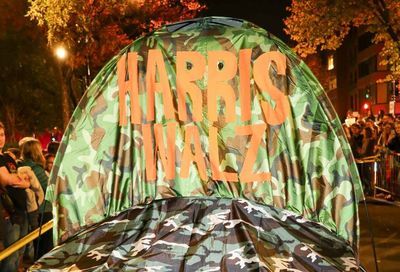Tennessee GOP Wants Drag Queens to Register as “Adult Entertainers”
"There is nothing inherently sexual about drag," fires back Nashville drag queen Veronika Electronika, of the bill which has thankfully stalled.
By John Riley on March 24, 2023 @JRileyMW

A bill introduced in Tennessee that would have forced drag performers to register with the state has stalled. But advocates are wary of declaring victory just yet, given the possibility that lawmakers could do an end-around the committee process and force a vote on the bill.
House Bill 30, sponsored by Rep. Clay Doggett (R-Pulaski), and its companion, Senate Bill 841, sponsored by Sen. Joey Hensley (R-Hohenwald), would have required “adult cabaret entertainers” — including go-go dancers, exotic dancers, topless dancers, and “male or female impersonators” — to obtain a permit from a county-level “adult-oriented establishment board” in order to perform for compensation.
The bill is intended to expand upon a separate bill, signed into law by Gov. Bill Lee (R) earlier this year, aimed at banning drag performances in public spaces or in private spaces where such shows might potentially be viewed by minors.
The House version of the bill passed the Republican-dominated lower chamber by a vote of 74-23, but the bill stalled in the Senate after failing to get a second sponsor in committee.
Nashville drag queen Veronika Electronika said opponents are hopeful that the failure to find a lawmaker to “second” the bill may indicate some reticence from lawmakers to force a vote on it.
“That particular bill…would have affected liquor sales at a lot of venues across the state and the city of Nashville,” she told Metro Weekly in an exclusive interview. “I assume that’s why it didn’t have any additional legs in committee — it would have prevented hotels, restaurants, bars, any venue that had any sort of performers inside, from selling alcohol.
“It would have kept them from having children in the restaurant. And it just would have been detrimental to nightlife and entertainment in Tennessee in general.”
The bill was intended to expand upon a separate bill, signed into law by Gov. Bill Lee (R) earlier this year, aimed at banning drag performances in public spaces or in private spaces where such shows might potentially be viewed by minors.
The registration bill reiterates the purpose of the anti-drag law, declaring that no public, private, or commercial establishment may allow a minor to enter their premises or attend a performance if that establishment hosts so-called “adult cabaret entertainment.”
The bill also revises the definition of an adult entertainer as a person whose performance involves “actual or simulated specified sexual activities, including removal of articles of clothing or appearing unclothed, regardless of whether a fee is charged or accepted for the performance and regardless of whether the performance is provided as an employee or an independent contractor.”
Some advocates fear requiring permits would create a database of drag performers, with personally identifying information that could be potentially exploited if it fell into the wrong hands.
“I don’t think it’s a good idea, especially for a community that’s already vulnerable,” Noah Corbin, a performer and representative of Chattanooga Pride, told the Chattanooga Times Free Press.
Electronika, who previously worked, both in and out of drag, as a host for the Kings of Hustler Club Nashville, a male strip club, said that she has previously had to obtain a sexually-oriented business entertainers’ license for that job, even though she wasn’t technically stripping.
However, she also noted that if a venue is licensed as a “sexually-oriented business,” it cannot serve alcohol on premises, meaning patrons would have to “BYOB” or bring their own alcoholic drinks purchased from elsewhere.
“I’ve had a sexually-oriented business entertainers’ license before, and I asked the person in charge of the county licensing office, ‘What do you think about drag queens needing this license?’ And she said, ‘It’s ridiculous, because what you guys do is not what those girls do on that pole. It’s just a different art form. There’s no need to bog down our office to give out licenses to the dozens and dozens and dozens of drag queens in Nashville alone, let alone across the whole state,'” Electronika said.
Electronika believes the so-called “ban” on public drag is “weak as water” and doesn’t actually ban drag, because most drag performances are not inherently sexual or meet the law’s criteria of “appealing to a prurient interest” or lacking “literary, artistic, political, or scientific values.”
She says that most drag performers edit their shows, depending on their audience, and would not perform sexually-tinged acts in a place where they could be viewed by minors.
“The bill is vague enough that if someone wants to find a problem with a drag performance or a go-go boy performance or a burlesque performance, they could find a problem. But on its face it, those problems do not exist,” she said.
“The bill says that you cannot perform go-go dancing, burlesque shows, male or female impersonation, or similar entertainment in an over-sexualized manner, or be stripping off of your clothing down to nudity or presumed nudity in a public place or in a private place where children might see you. Well, we don’t do that anyway,” Electronika said. “So this bill did not create anything but panic. It just makes us more fearful about performing, because we may be targeted by people who want to find a problem with it. They’re trying to create a solution to a problem that doesn’t exist.”
Electronika said it’s often difficult to unpack the reasons why lawmakers believe that drag is so harmful or problematic, other than that they seem to be following a set of predetermined “talking points.”
“It’s not drag that’s setting them off,” she said. “It’s themselves, and it’s conservative talking points and the media. There is nothing inherently sexual about drag.
“So it’s not the drag that setting them off, it’s LGBT culture in general that makes them uncomfortable. And the easiest way to get something banned or ostracized is to call it ‘sexual,’ because, you know, in the United States, sex is so taboo that if you equate anything to sex, it will be the first thing that people will say, ‘Oh, well, that needs to not be done or not be talked about. We need to do what we can to get rid of it,’ regardless of the facts.
“There are chains of restaurants in this country that make millions and millions of dollars where their servers are wearing cropped-top tank tops, and they have ‘kiddy menus’ in their restaurant. But because it’s not an LGBT culturally-related phenomenon, it’s not frowned upon like other things are.”
Electronika says the reason underlying Republicans’ obsession with drag and LGBTQ issues is transparent.
“They’d rather create a false problem with a solution that just hurts people, because it’s bright, loud, and shiny, and it’s a distraction from the real issues that we have in this country,” she said.
She adds that laws seeking to restrict drag may be unfairly enforced against transgender individuals who are simply living as their authentic selves in order to placate social conservatives who take issue with the idea of transitioning.
“Our trans brothers and sisters are most vulnerable to this type of legislation, especially in states where they would consider a trans person to be a ‘male or a female impersonator,'” she said. “So if a trans person is singing karaoke, they could call them a ‘male or female impersonator’ performing. While that’s not what they’re doing, they’re just trying to live their everyday lives, they are the people most at risk from legislation like this.
“I feel we need to make sure that we understand as a community that it is always the objective of the conservative movement to vilify trans people, whether they’re talking about drag or they’re talking about bathrooms, or they’re talking about sports, or whatever. Unfortunately, trans people are not afforded protections federally, so the states are able to come after gender identity so easily because it is not a federally-protected class.”
Chase Strangio Will Make Transgender History at Supreme Court
The ACLU lawyer will argue that Tennessee's ban on gender-affirming care -- and those in other states -- should be overturned.
By John Riley on October 24, 2024 @JRileyMW
The U.S. Supreme Court has granted a petition for divided argument in U.S. v. Skrmetti, the federal challenge to Tennessee's law prohibiting doctors from prescribing treatments for gender dysphoria to transgender youth.
The court previously agreed in June to take up the case, as well as its companion case, L.W. v. Skrmetti, during the 2024-2025 court session.
The outcome of the case will likely determine the fate of similar laws in 23 other states, where Republican lawmakers have sought to criminalize the provision of gender-affirming care, like puberty blockers or hormones, to transgender youth to help them transition and assuage their feelings of gender dysphoria.
Porn Stars Blast Trump With a Bold Ad Campaign
The porn industry is railing against conservative attempts to ban pornography, as suggested by the MAGA directive Project 2025.
By John Riley on October 15, 2024 @JRileyMW
The adult entertainment industry has launched a campaign intended to warn voters of the risks of a Donald Trump presidential win to the production and distribution of pornographic content.
The "Hands Off My Porn" campaign is taking direct aim at Project 2025, the Heritage Foundation blueprint for a future Republican presidential administration, and tying some of its more controversial proposals to Trump directly.
As reported by The New York Times, the $100,000 advertising campaign will be carried out largely online, with spots warning about conservative proposals to ban pornography running on pornographic websites.
Staten Island St. Patrick’s Day Parade to Allow LGBTQ Groups
Following years of public pressure, parade organizers finally lifted a ban on LGBTQ groups marching in the annual parade.
By John Riley on November 19, 2024 @JRileyMW
The St. Patrick's Day parade on Staten Island has finally broken a 60-year ban and will allow LGBTQ groups to march in the annual event.
Organizers have invited the Pride Center of Staten Island, a local community nonprofit, to march in the upcoming celebration on March 2, 2025.
The invitation was extended to the Pride Center -- which had battled with past leadership over the exclusion of LGBTQ groups -- following a change in leadership within the Richmond County St. Patrick’s Day Parade Committee, which organizes the parade.
"The parade committee is entrusted with ensuring the focus of the parade remains upon Saint Patrick, the history, traditions, culture, and faith of the Irish people," the committee said in a statement. "In this endeavor, the leadership of The Pride Center has assured the parade committee that they are ready to provide support to the parade in fulfilling this obligation."
Support Metro Weekly’s Journalism
These are challenging times for news organizations. And yet it’s crucial we stay active and provide vital resources and information to both our local readers and the world. So won’t you please take a moment and consider supporting Metro Weekly with a membership? For as little as $5 a month, you can help ensure Metro Weekly magazine and MetroWeekly.com remain free, viable resources as we provide the best, most diverse, culturally-resonant LGBTQ coverage in both the D.C. region and around the world. Memberships come with exclusive perks and discounts, your own personal digital delivery of each week’s magazine (and an archive), access to our Member's Lounge when it launches this fall, and exclusive members-only items like Metro Weekly Membership Mugs and Tote Bags! Check out all our membership levels here and please join us today!
The Magazine
-
Most Popular
 Speaker Mike Johnson Imposes a Trans Restroom Ban
Speaker Mike Johnson Imposes a Trans Restroom Ban  A Grim Report Details Anti-Trans Violence in America
A Grim Report Details Anti-Trans Violence in America  Trump Taps Anti-LGBTQ Matt Gaetz for Attorney General
Trump Taps Anti-LGBTQ Matt Gaetz for Attorney General  Gay People Targeted with 'Re-Education Camp' Texts
Gay People Targeted with 'Re-Education Camp' Texts  Sarah McBride Criticized for Complying with Restroom Ban
Sarah McBride Criticized for Complying with Restroom Ban  John Leguizamo's America
John Leguizamo's America  Nancy Mace Wants to Ban Sarah McBride from Capitol Restrooms
Nancy Mace Wants to Ban Sarah McBride from Capitol Restrooms  Gay Adult Film Star Blasted for Hailing Trump's Victory
Gay Adult Film Star Blasted for Hailing Trump's Victory  Same-Sex Kiss Cut from 'Gladiator II'
Same-Sex Kiss Cut from 'Gladiator II'  Man Sentenced to Life for Murder of Gay Jewish Student
Man Sentenced to Life for Murder of Gay Jewish Student
 Sarah McBride Criticized for Complying with Restroom Ban
Sarah McBride Criticized for Complying with Restroom Ban  Man Sentenced to Life for Murder of Gay Jewish Student
Man Sentenced to Life for Murder of Gay Jewish Student  Speaker Mike Johnson Imposes a Trans Restroom Ban
Speaker Mike Johnson Imposes a Trans Restroom Ban  Gay People Targeted with 'Re-Education Camp' Texts
Gay People Targeted with 'Re-Education Camp' Texts  A Grim Report Details Anti-Trans Violence in America
A Grim Report Details Anti-Trans Violence in America  Nancy Mace Wants to Ban Sarah McBride from Capitol Restrooms
Nancy Mace Wants to Ban Sarah McBride from Capitol Restrooms  Staten Island St. Patrick's Day Parade to Allow LGBTQ Groups
Staten Island St. Patrick's Day Parade to Allow LGBTQ Groups  LaMelo Ball Fined $100,000 by NBA for Anti-Gay Slur
LaMelo Ball Fined $100,000 by NBA for Anti-Gay Slur  Rodrigo Heng-Lehtinen on “The New Chapter of Our Resistance”
Rodrigo Heng-Lehtinen on “The New Chapter of Our Resistance”  Same-Sex Kiss Cut from 'Gladiator II'
Same-Sex Kiss Cut from 'Gladiator II'
Scene
Metro Weekly
Washington's LGBTQ Magazine
P.O. Box 11559
Washington, DC 20008 (202) 638-6830
About Us pageFollow Us:
· Facebook
· Twitter
· Flipboard
· YouTube
· Instagram
· RSS News | RSS SceneArchives
Copyright ©2024 Jansi LLC.










You must be logged in to post a comment.